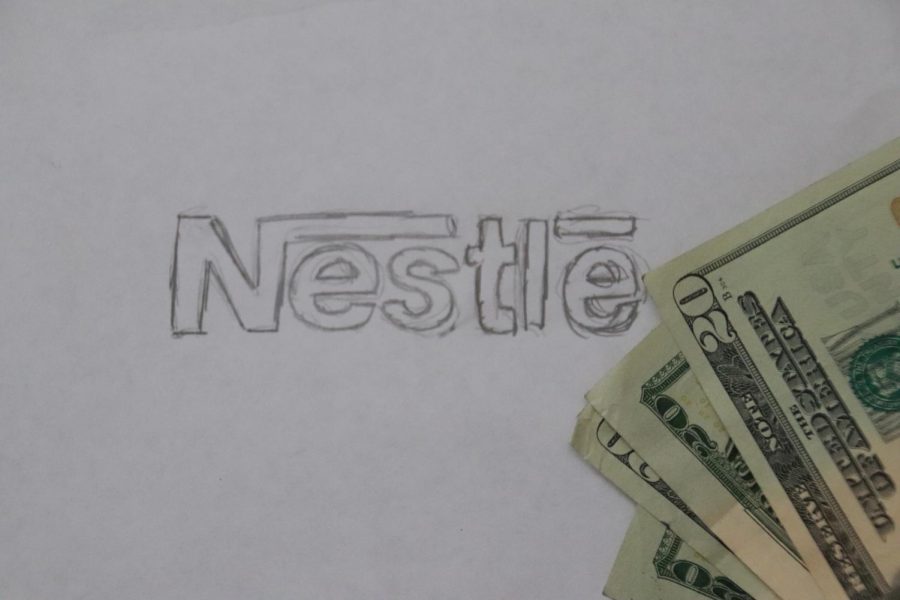Nestlé Spends Billions on Sustainability
March 2, 2020
Recently, an organization called BreakFreeFromPlastic released its third annual ranking of the world’s top plastic polluters. BreakFreeFromPlastic is a group of just under 1,500 companies working together towards a plastic-free future. This annual analysis requires an immense amount of effort to produce. Last year, there were over 72,000 volunteers across 51 countries, including more remote areas of Bhutan, Nigeria, the Philippines, and Indonesia. The volunteers collected littered plastics they found close to where they lived. 476,000 pieces were gathered, and 43 percent of the collected waste was clearly marked with a consumer brand.
Over 8,000 brands were recorded as responsible for producing this trash. In the most recent analysis, the top ten companies responsible for litter, were Coca-Cola, Nestlé, PepsiCo, Mondelez International, Unilever, Mars, P&G, Colgate-Palmolive, Philip Morris, and Perfetti Van Melle. It is no surprise that the top three include some of the world’s most giant companies. However, it is quite shocking that these brands were in the same position on BreakFreeFromPlastics’s ranking last year. Throughout the majority of 2019, none of these companies made any significant changes to lessen their ecological impacts. As freshman Sam Carver puts it, “The market for reusable plastics barely even exists.”
The runner up on this list, Nestlé, has been blamed by activists for draining aquifers, fueling obesity with fatty and sugary foods and littering the world with plastic packaging, none of which are false accusations. However, they are an extremely successful parent company and continue to dominate a variety of global markets such as baby formula, coffee, ice cream, pet food, and bottled water.
On Jan. 16, Nestlé made a few public statements on how they are moving towards sustainability. In the past, they have proven themselves to be a somewhat ethical company, fighting against foreign child labor laws and gender inequities in the workplace. Nestlé announced that it would be cutting costs within other areas of the company to invest up to $2 billion to lead the shift from virgin plastics to food-grade recycled plastics and to accelerate the development of innovative sustainable packaging solutions.
Nestlé’s goals include playing an active role in the development of well-functioning collecting, sorting and recycling schemes across the countries where they operate. They also hope to work with value chain partners and industry associations to explore different packaging solutions to reduce plastic usage, along with facilitating recycling and developing new approaches to eliminate plastic waste. Nestlé also wants to label plastic product packaging with recycling information to help consumers dispose of it in the correct way, while also promoting a market for recycled plastics by continuing to increase the proportion of recycled plastics in packaging. Their big goals are to reduce their plastic production by one third by 2025 and to use no virgin plastics by 2050.
Since their announcements, quite a few actions have been taken. First, Henniez (one of the many companies owned by Nestlé) announced that its entire plastic bottle range is now made of 75 percent recycled plastics. Second, Nestlé is currently collaborating with Burcon and Merit, two key players in the development and production of high-quality plant proteins. This partnership will enable Nestlé to further accelerate the development of nutritious and great-tasting plant-based meat and dairy alternatives with a more favorable environmental footprint.
Since Nestlé is such a large company further dedication towards this friendly ecological cause will have a massive impact on the small market for recyclable plastics. Nestlé said it would be paying above the market rate for the recycled material. This will alleviate a shortage of used plastics suitable for food packaging by luring new suppliers into the business. Chief Executive of Nestlé Mark Schneider states that “making recyclable plastics safe for food is an enormous challenge for our industry.” Because the plastics need to be food-safe and recyclable, it is much harder for food companies to produce. The difficulty is likely why this market is so minimal. Sophomore Alara Walcott believes that Nestlé has “the money to startup the market.” Schneider states, “In addition to minimizing plastic use and collecting waste, we want to close the loop and make more plastics infinitely recyclable.”
Eliminating the use of plastic is extremely important in protecting not only the environment but our own health. Senior Danielle Levin says, “People need to start acknowledging the consequences of our actions.” The manufacturing of single-use plastics and their disposal creates large amounts of greenhouse gas emissions. In 2019, the amount of emissions created by the production and incineration of single-use plastics was equal to the emissions made by 189 five hundred megawatt coal plants, which is around 850 million metric tons of carbon dioxide and methane.
The use of plastics also affects the human body in many known and even more unknown ways. The air pollution can cause many short and long term changes to people’s reproductive, digestive, neurological, and especially respiratory systems. Once the plastic products have been made, chemicals in plastic get to water and food. This causes people to consume these chemicals leading to a variety of health problems such as hormonal disruption and cancer. Even after the plastic is disposed of, it will continue to affect the human body. Plastic does not biodegrade, they just break down over time into microplastics, which also end up in food and water sources. During a week, the average human consumes the amount of plastic needed to make a credit card. We do not have a full idea of what negative impacts microplastics have on the body. However, scientists have determined that they are extremely toxic to our livers and that marine life has already been traumatized by the amount of plastic in the ocean. There are also costs we cannot really quantify, like the number of people who have died from causes related to plastic production and disposal and the permanent effects of climate change that plastic has contributed to.
We know so much about the negative effects of plastic, and it has been proposed by many that the companies responsible for this should be charged for the healthcare costs, carbon emissions, and cleanup. However, Nestlé has been contributing to change along with many other companies. The best thing that a company can do is follow in their footsteps and contribute to sustainability, not only to help the planet but for marketing reasons. Many people agree with junior, Gio Nickerson, who says, “I’m more inclined to support a company who is kind to the planet and its people.”




